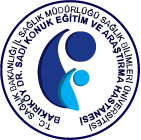ABSTRACT
Objective:
The aim of this study is to examine if postnatal education of mothers has an effect to decrease the frequency of exchange transfusion in healthy newborns.
Material and Methods:
The sociodemographic characteristics of mothers that gave birth between April 2003-July 2005 in our hospital, who were given “postnatal mother education” and their babies, were evaluated retrospectively. A comparison was made with the characteristics of mothers whose babies were hospitalized in newborn unit and performed exchange transfusion because of indirect hyperbilirubinemia, during the same period.
Results:
Mean age of mothers giving birth in our hospital was 26.2±5.2 (15-45) years. Total number of mothers below 19 years were 227 (8.5%). Multigravidarum was asseses mostly in mothers graduated from primary school, and this was statistically significant (p=0.000). Mothers of high school graduates have high incidence of smoking.
Conclusion:
Although mothers have a low education level, to inform about baby care and observation of jaundice beside breast milk education will decrease the rate of exchange transfusion of newborns. We think that the most appropriate method is to begin this education before birth and keep on at the postnatal period.



